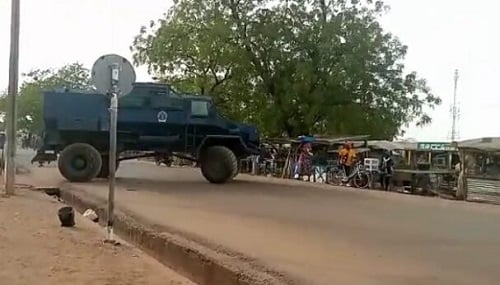The escalating violence in Bawku, a town nestled near Ghana’s northeastern border with Burkina Faso and Togo, has prompted the Ghana Police Service to implement stringent security measures to protect its personnel. The region has long been a hotbed of chieftaincy disputes and ethnic tensions, leading to recurring outbreaks of violence that threaten national security and impede law enforcement operations. The recent killing of two police officers in Binduri, a community adjacent to Bawku, shortly after the Inspector General of Police (IGP) visited the area to appeal for peace, underscores the perilous environment faced by security forces. This incident has catalyzed the implementation of new directives aimed at safeguarding police officers and their families.
The IGP, Christian Tetteh Yohuno, has imposed a temporary ban on the movement of police officers and their families into Bawku and its surrounding areas. This measure is a direct response to the heightened risk faced by law enforcement personnel operating in the volatile region. Furthermore, all officers currently stationed in Bawku are now required to wear protective gear at all times and are permitted to travel only with armored escorts. These precautions underscore the gravity of the situation and the Ghana Police Service’s commitment to ensuring the safety of its officers deployed in what is considered one of the most dangerous security zones in the country. The volatile climate necessitates these extraordinary measures to mitigate the risks faced by police personnel working to maintain order in the conflict-ridden area.
The situation is further complicated by a prevailing atmosphere of public mistrust and allegations of police complicity in the recent killing of a local youth leader. This incident has inflamed tensions and fueled suspicion towards law enforcement, creating an additional layer of complexity for the Ghana Police Service as it strives to restore peace and maintain order. The accusations not only undermine public confidence in the police but also create a challenging environment for officers working to de-escalate the violence. This erosion of trust hinders cooperation between the community and law enforcement, making it more difficult to address the root causes of the conflict and implement effective security strategies.
The Ghana Police Service has reiterated its commitment to restoring calm in Bawku while prioritizing the safety of its personnel. The IGP has emphasized the critical role of intelligence-led policing in the area and has called upon community members to actively support efforts aimed at de-escalating the violence. This appeal for collaboration recognizes the importance of community engagement in resolving the underlying issues fueling the conflict. Building trust and fostering cooperation between the police and the community is essential for gathering vital intelligence, implementing effective security measures, and ultimately achieving lasting peace.
The current situation in Bawku demands a multi-faceted approach that addresses both the immediate security concerns and the deep-rooted causes of the conflict. The temporary restrictions on police movement and the mandatory use of protective gear are crucial for protecting officers in the short term. However, long-term stability requires addressing the underlying issues of chieftaincy disputes and ethnic tensions. This involves fostering dialogue between the conflicting parties, promoting reconciliation, and addressing the socio-economic factors that contribute to the unrest.
National security stakeholders are closely monitoring the developments in Bawku and are actively engaged in efforts to stabilize the region and protect both security personnel and residents. This high-level attention underscores the significance of the situation and the potential for the conflict to destabilize the wider region. The ongoing violence necessitates a comprehensive and collaborative approach involving various stakeholders, including government agencies, local leaders, community organizations, and international partners. Only through sustained and coordinated efforts can lasting peace be achieved and the cycle of violence be broken in Bawku. The complex interplay of factors fueling the conflict requires a nuanced and long-term strategy that addresses the root causes of the violence and promotes sustainable peace and development in the region.














